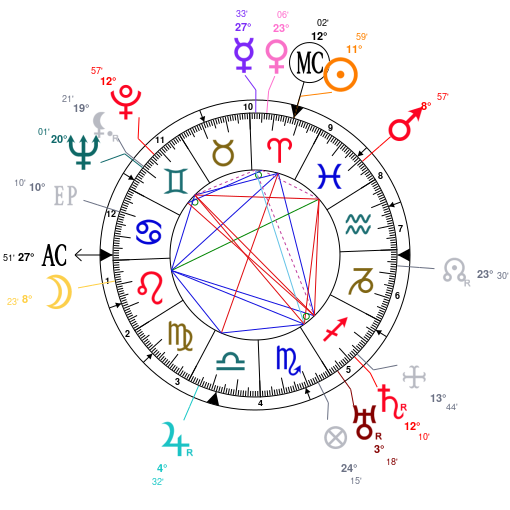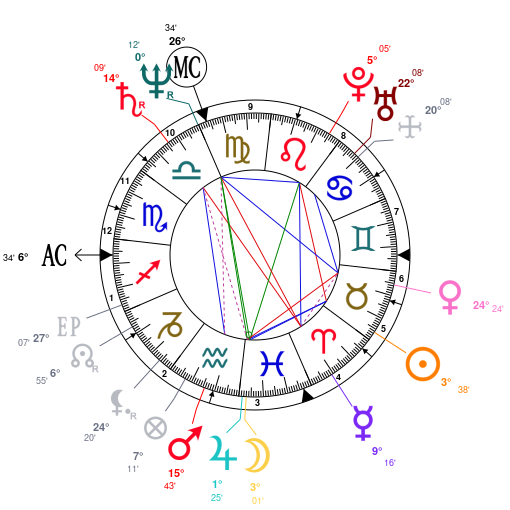Blacknight
Well-known member
Really interesting individual I just read about. Both parents were very smart, and they combined their intellects to shape the mind of their son at the very start of his infancy.
William Sidis was born on April 1, 1898; birth time unknown.
He died on July 17, 1944 from a brain hemorrhage at 46.
Some wiki info on the father:
And his chart:

Too bad his birth time is unknown!
http://www.damninteresting.com/the-rise-and-fall-of-william-j-sidis said:The Rise and Fall of William J. Sidis
In the waning years of the nineteenth century, boatloads of Russian Jewish immigrants were arriving in New York harbor as they fled from the religious and political persecution of their homeland. Boris and Sarah Sidis arrived in such a fashion, and they quickly gained notoriety in the United States as brilliant individuals. Boris established a reputation for himself as a pioneer in the study of psychology, and his wife Sarah became one of only a handful of women in America to receive a medical degree. Though they were widely regarded as the possessors of highly gifted minds, they were also renowned for their eccentricities.
After breezing through Harvard as a student, Boris became a professor of psychology there, where he taught and wrote about his ground-breaking theories in the field. He was influential in the areas of hypnosis, group psychology, and mob frenzy; and he was fascinated with the effects of evolution on the human psyche. He was also an advocate of some bizarre treatments such as the “rest cure,” whereby victims of mental disorders were isolated in bed for up to two months, sometimes in tandem with electrotherapy. Much of Boris’s work was experimental and adventurous in a time when the field of psychology was making great strides.
On April Fool’s day in 1898, Boris encountered a unique opportunity to begin applying his eccentric theories of psychology in a real-world environment: his wife Sarah gave birth to a son. Under the tutelage of these ingenious yet neurotic parents, young William James Sidis developed into an individual with astonishing talents.
Boris and Sarah began their child’s education in his first few months, and William’s infant mind absorbed the information at an extraordinary rate. Using wooden blocks, Boris began demonstrating the alphabet to his young son, using techniques similar to hypnosis to coax the baby into pronouncing the letters. At six months, William uttered the word “door,” and by the following month he had doubled his vocabulary to include “moon.” At eight months old, his proud parents boasted that he was able to feed himself with a spoon, a skill that very few children develop within their first year. He was also able to recognize and repeat the letters on Boris’s toy blocks, giving him a four-year-old’s grasp of symbol recognition.
The Sidises believed that aggressive curiosity was a quality to be nurtured, so Sarah gave up her career in medicine to dedicate her life to the child’s development. William’s thirst for knowledge never went unquenched, and by his first birthday– an age when most children are still babbling– he was honing his spelling skills. At one and a half years of age, he was reading the daily newspaper.
As William approached his fifth birthday, his spectacular abilities began to draw the attention of the press. He had taught himself to operate the typewriter from his high chair, tapping out a letter to Macy’s regarding an order for toys. He had also taken it upon himself to learn Latin, Greek, Russian, French, German, and Hebrew. His appetite for information seemed endless as he easily chewed through weighty tomes such as Gray’s Anatomy and the works of Homer. He entered grammar school at age six, but in just over half a year he had advanced into high school curriculum. His stunning accomplishments soon became a frequent feature on the first page of the New York Times.
William James SidisBoris and Sarah were understandably proud of their son and his intellectual achievements. By cultivating his precocious nature it seemed that they had confirmed some of their outlandish theories, and they paraded young William around as evidence of this. But the question of how much was due to their influence and how much was was due to his own natural genius is a matter of some debate. Whatever their approach may have contributed to his development, it is clear that his mind had a natural propensity for gorging itself on information.
At age nine William attempted to enroll at Harvard, and though the entrance exams were not a challenge for the young intellect, he was turned down on the basis that he was too “emotionally immature” for college life. As William waited for the Harvard admissions board to capitulate, he spent the intervening time at Tufts College correcting mistakes in mathematicians’ books, perusing Einstein’s theories for possible errors, mastering foreign languages, and diligently collecting streetcar transfer slips. He discovered that he could mentally calculate the day of the week for any given date in the past or in the future, and he wrote four books. When the boy prodigy reached eleven years of age in 1909, the prestigious university finally relented and accepted William as a student.
On a cold January evening in 1910, about a hundred professors and advanced math students gathered in a Harvard lecture hall to observe the eleven-year-old William Sidis’s first public speaking presentation. He spoke in a quiet, shy voice and had to stifle the occasional giggle, but his lecture on Four-Dimensional Bodies was very well received. It was sufficiently advanced that it bewildered many of his audience members, as indicated by the depth of his introduction:
“My own definition of the Fourth Dimension would be that it is an Euclidian space with one dimension added. It is the projection of the figures of the Third Dimension into space. The third dimensional figures, such as the cube, are used as sides of the figures of the Fourth Dimension, and the figures of the Fourth Dimension are called configurations. It is not possible to actually construct models of the figures of the Fourth Dimension, or to conceive of them in the mind’s eye, but it is easy to construct them by means of Euclid’s theorem.”
Sidis graduated *** laude at age 16, having grown a bit introverted in response to the sudden fame and pressure. At his graduation, he told the gathered newspapermen, “I want to live the perfect life. The only way to live the perfect life is to live it in seclusion. I have always hated crowds.” He began a lifelong policy of vigorously rejecting sex, art, music, or anything else that would distract him from the pursuit of pure knowledge.
William briefly taught mathematics at Rice University in Houston, but he resigned when it became apparent that his age and fame were inescapable distractions to the students. He went back to Harvard for a short time to pursue a law degree, but dropped out when he found that the law did not suit him. In 1919 William was once again subjected to public scrutiny when he was arrested for participating in an anti-draft demonstration which developed into a riot. The ensuing trial further underscored his unconventional philosophies, such as his lack of a belief in God– particularly the “big boss of the Christians”– and his socialist leanings. His political views later evolved into something resembling Libertarianism.
Sidis made a noble effort to avoid the public eye in his adult years. He wrote several books, but most of them were under assumed names and about obscure subjects. One such book, entitled Notes on the Collection of Streetcar Transfers, discusses his unusual hobby of peridromophilia at painstaking length. The work was described by one Sidis biographer as “the most boring book ever written.” William also alluded to the existence of dark matter before it had been formally theorized, and wrote about how one democratic Native American tribe may have strongly influenced the politics of America’s founders. In the meantime he continued to learn new languages, absorbing dozens of foreign tongues with ease.
A clipping from Boston Traveler (click for full view)A clipping from Boston Traveler (click for full view)The press continued to hound William for years, poking fun at his humdrum jobs and scorning his neglected potential. One New Yorker article entitled “April Fool” was so scathing and filled with personal details that it prompted Sidis to sue for invasion of privacy, a case which went all the way to the U.S. Supreme Court. He finally won a partial victory in 1944, but it was a bittersweet success.
William did not live long after that; in the following July his landlady telephoned the police after discovering him unconscious in his Boston apartment. Forty-six year old Sidis had suffered a massive stroke, and he never again regained consciousness. Such was the end of the one-time prodigy who had astonished a Harvard math audience at age eleven; he died a reclusive, penniless office clerk.
Those who knew him in his later life spoke of his conspicuous brilliance and his mastery of over forty languages, but his tangible contributions to society seemed to be relatively few for someone of his talents. Some argue that his parents pushed him too hard in his youth– overexerting his exceptional mind at an early age– and some blame the press for driving him into isolation. There is considerable evidence that William favored the Okamakammesset tribal philosophy of “anonymous contribution”, a principle which implies that one’s value is not measured by one’s visible contributions to society.
Though he probably would not have put much stock in formal measures of intelligence, it is estimated that William Sidis’s IQ was as high as 300, where 100 is average and over 140 is considered genius. Whatever the reason for his underwhelming output later in life, he was certainly one of the most profoundly gifted human beings who ever lived. There is no telling what William might have accomplished for mathematics and science if only his talents had not been squandered.
William Sidis was born on April 1, 1898; birth time unknown.
He died on July 17, 1944 from a brain hemorrhage at 46.
http://en.wikipedia.org/wiki/William_James_Sidis said:His father had died of the same malady in 1923 at age fifty-six.
Some wiki info on the father:
http://en.wikipedia.org/wiki/Boris_Sidis said:Boris Sidis, Ph.D., M.D. (/ˈsaɪ dɪs/; October 12, 1867 – October 24, 1923) was a Russian American psychologist, physician, psychiatrist, and philosopher of education.
And his chart:

Too bad his birth time is unknown!

 It does suck being an outsider when you don't jive with the people already in place. With that German exchange student, I sensed he preferred not to associate himself with the kids at my HS even thought everyone was really welcoming. I mean he wasn't the only German student and the other one was pretty social. Maybe he just couldn't socialize. And yeah my dad's motto with life is whatever you do don't lose your sense of humor. It's definitely one of life's key ingredients.
It does suck being an outsider when you don't jive with the people already in place. With that German exchange student, I sensed he preferred not to associate himself with the kids at my HS even thought everyone was really welcoming. I mean he wasn't the only German student and the other one was pretty social. Maybe he just couldn't socialize. And yeah my dad's motto with life is whatever you do don't lose your sense of humor. It's definitely one of life's key ingredients. as "real" knowledge and literally shuts themselves off from other things like art, emotion and sex.
as "real" knowledge and literally shuts themselves off from other things like art, emotion and sex.
